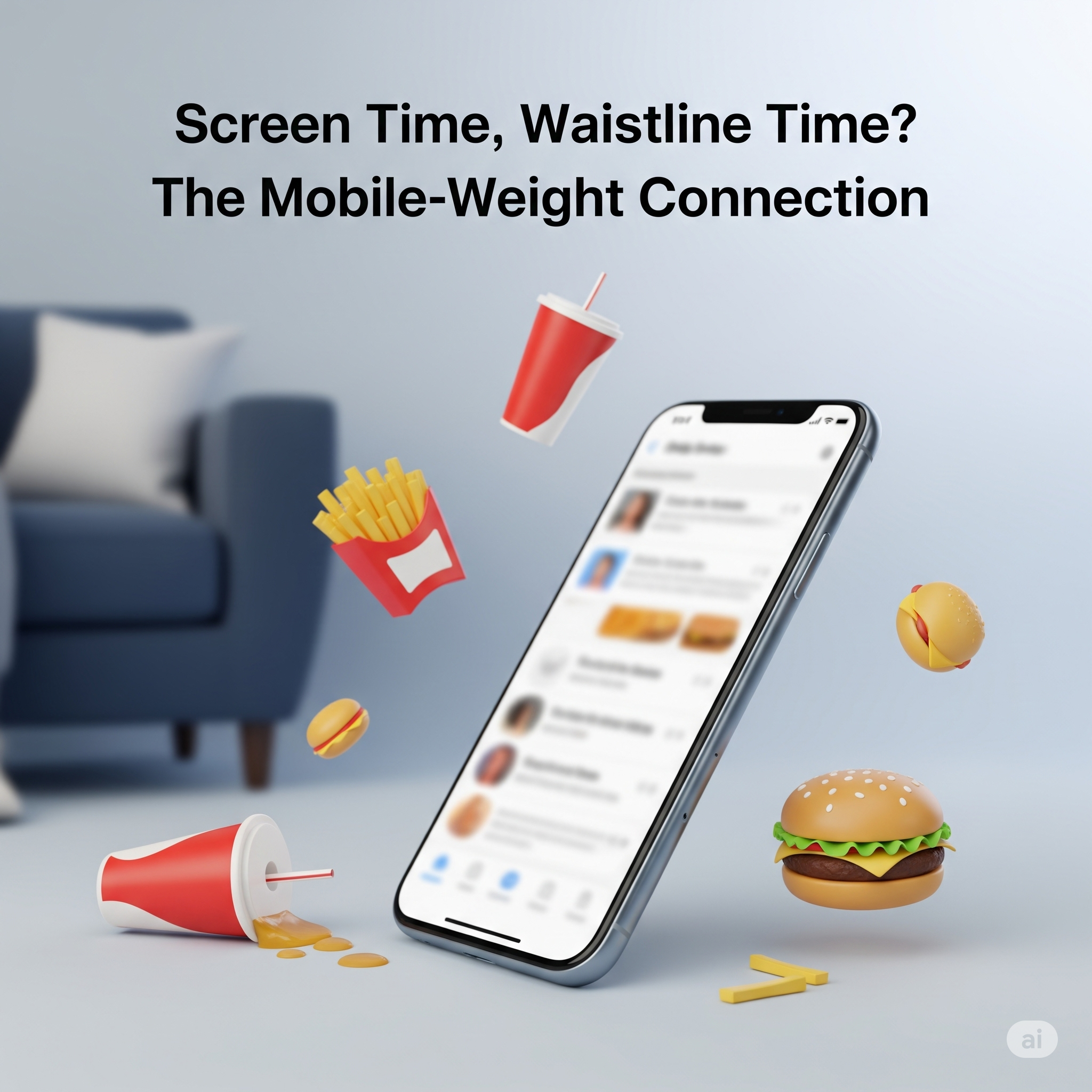I. Introduction
In today’s digital era, mobile devices have become essential to modern life. From checking emails and scrolling social media to watching videos and ordering food, smartphones are a constant companion. However, alongside this rise in screen time, there’s another alarming trend — the global surge in obesity rates.
While poor diet and lack of exercise are widely recognized causes, emerging research and behavioral patterns suggest that mobile devices may be playing a significant — yet often overlooked — role in weight gain. This blog explores how smartphones and similar technologies contribute directly and indirectly to increased body weight and how mindful use can mitigate the risk.
II. Direct Mechanisms of Mobile Device-Related Weight Gain
A. Sedentary Behavior and Reduced Physical Activity
Mobile devices promote a sedentary lifestyle. Hours spent scrolling, gaming, or binge-watching can replace time that could otherwise be spent engaging in physical activities.
- Screen Time Replaces Movement: Instead of walking or engaging in hobbies, people spend long hours sitting with their phones.
- Children’s Outdoor Time Drops: Kids now prefer mobile games to outdoor play, reducing their overall physical activity.
- Loss of Incidental Movement: Simple activities like walking to a desktop are now replaced by using a phone while lying on a bed or couch.
- Reduced NEAT: Non-Exercise Activity Thermogenesis (NEAT), the energy burned during daily activities, declines with prolonged phone use.
B. Disrupted Sleep Patterns
Excessive mobile use, especially at night, interferes with sleep quality and duration — both critical to maintaining a healthy weight.
- Blue Light Delays Sleep: The blue light from screens suppresses melatonin, the hormone responsible for sleep.
- Delayed Bedtime: Scrolling late at night leads to less total sleep time.
- Interrupted Sleep: Notifications and alerts can wake users up or prevent deep, restorative sleep.
- Appetite Hormone Imbalance: Sleep deprivation alters ghrelin and leptin levels, increasing hunger and cravings, especially for unhealthy foods.
C. Mindless Eating and Increased Caloric Intake
Mobile phones distract users during meals, contributing to overeating.
- Eating While Distracted: Watching content or browsing during meals reduces attention to how much one eats.
- Ignoring Fullness Cues: Distraction makes it harder to recognize when you’re full.
- Poor Food Choices: Screen time often coincides with consumption of chips, fast food, and sugary snacks.
- Ease of Food Delivery: Apps like Zomato or Swiggy make unhealthy food choices just a few taps away.
III. Indirect Mechanisms of Mobile Device-Related Weight Gain
A. Impact on Dietary Habits
- Exposure to Food Marketing:
- Constant ads for junk food tempt users.
- Influencers promote indulgent meals and cheat days.
- Delivery apps push high-calorie combos through discounts and offers.
- Reduced Home Cooking:
- Mobile convenience means less time cooking and more ordering.
- Meals from apps tend to be higher in calories and fats than home-cooked food.
- Social Media Influence:
- The trend of “food porn” encourages overindulgence.
- Seeing friends or influencers eating out frequently promotes unhealthy social eating habits.
B. Mental Health and Psychological Factors
- Increased Stress and Anxiety:
- Fear of missing out (FOMO) fuels endless scrolling.
- Negative interactions, cyberbullying, or news exposure can increase stress, leading to emotional eating.
- Body Image Issues:
- Constant exposure to idealized bodies may lead to dissatisfaction, binge dieting, and rebound weight gain.
- Addictive Behaviors:
- Excessive mobile use can replace healthy habits like cooking, exercising, or mindful eating.
- Dopamine-driven rewards from mobile use can mirror cravings for sugary or high-fat foods.
C. Socioeconomic Factors
- Healthy Food Costs More: Nutritious meals often cost more on food delivery apps compared to calorie-dense fast food.
- Limited Access to Reliable Info: Many users are influenced by unverified diet trends, misleading health advice, or fake nutrition claims.
- Targeted Marketing: Low-income groups are more vulnerable to aggressive marketing of unhealthy, cheap food via mobile platforms.
IV. Mitigation Strategies and Solutions
A. Promoting Mindful Mobile Use
- Set daily screen time limits.
- Create “no-phone” zones during meals and before bedtime.
- Try occasional digital detoxes to reset habits.
B. Encouraging Physical Activity
- Use fitness apps and smartwatches to track steps and workouts.
- Schedule active breaks during prolonged screen use.
- Encourage outdoor play and movement for children and teens.
C. Fostering Healthy Eating Habits
- Plan and cook meals at home more often.
- Be critical of food marketing on social media and apps.
- Use mobile tools for healthy recipe inspiration and meal tracking.
D. Prioritizing Sleep Hygiene
- Avoid phone use at least 30–60 minutes before bedtime.
- Activate blue light filters or night mode.
- Keep phones out of the bedroom or use silent mode during sleep.
E. Addressing Mental Health
- Promote digital wellness tools that monitor screen time and mood.
- Encourage seeking professional help for stress, anxiety, or body image concerns.
- Foster supportive online communities that promote health and self-acceptance.
V. Conclusion
Mobile devices have revolutionized our lives but have also quietly contributed to unhealthy weight gain through both direct and indirect means — from physical inactivity and poor sleep to stress and impulsive eating.
Raising awareness about these patterns is the first step. By using our devices more mindfully and incorporating healthy routines into our digital lives, we can counteract their negative effects. Public health campaigns, schools, parents, and individuals all have a role to play in building a balanced relationship with technology — one that supports both convenience and well-being.


